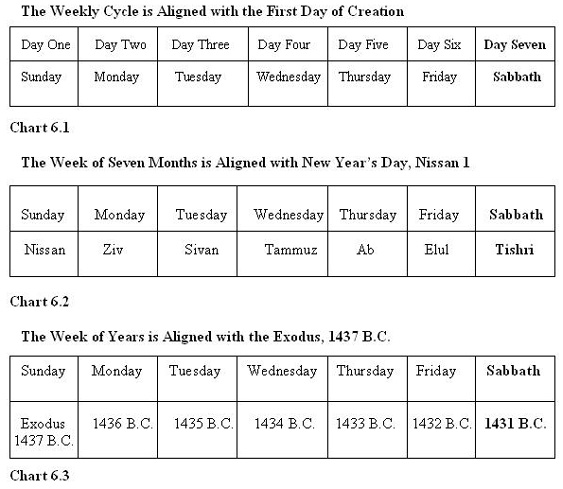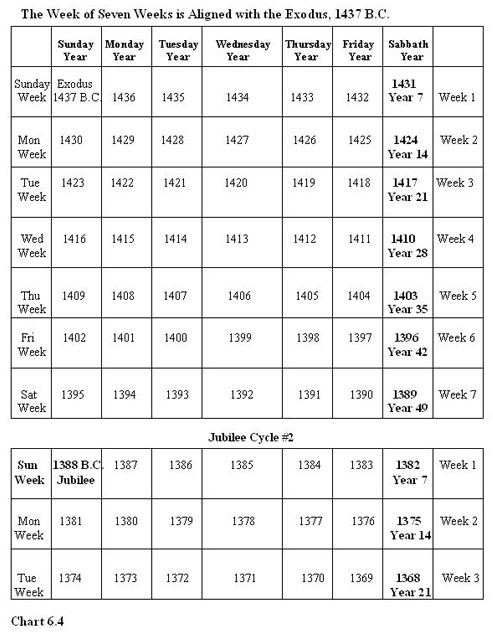The beauty of
understanding the synchrony of these
clocks begins to appear when one
realizes that all Sabbath years and
Jubilee years – forward and
backward – can be easily
calculated once a known year is
located. For the sake of comparison,
one could say that it is easy to
calculate paydays – both past
and future – when one knows what
day of the week payday occurs and how
often payday occurs! Synchrony makes
this type of calculation possible.

Look at Chart 6.4 and
count off nine years beginning
with the Exodus year. You should see
a Tuesday year, 1428 B.C. Now count
off ten weeks of years from
the Exodus year. What year falls in
the middle of the tenth week? (1371
B.C.) Bear in mind, the ten weeks
shown on Chart 6.4 are not part of
the seventy weeks that Gabriel spoke
about. Rather, these weeks mark the
beginning of the “weekly
clock” which God initiated at
the Exodus.

As we continue to
examine the synchrony of time, it
will become apparent that inserting a
gap of time between days, weeks and
years is impossible! When one year
ends, another year begins. When one
week of seven years end, another week
of seven years begin! When one
Jubilee cycle of forty-nine years
ends, a new Jubilee cycle begins! If
these cycles are broken, the
synchrony of the weekly cycle is
destroyed and, without synchrony,
time cannot be measured.
Why Seventy Weeks?
Gabriel said, “Seventy
weeks are determined….” Why
did God deliberately choose the
number “seventy weeks” as a
measure of time in Daniel 9:24? We
know that God is deliberate and
purposeful in everything He does. He
could have said, “Four hundred
ninety years are determined upon your
people….” Instead, God
chose to use the term
“weeks” as the measurement
of time in Daniel 9 instead of
“years,” because weeks have
a synchrony that years do not have!
We know that God initiated weeks of
years at the Exodus because He
required the land to lay fallow
during the Sabbath year! This fact
produces a key point: The seventy
weeks of Daniel 9 cannot begin with
just any year. God used the word
“weeks” because the seventy
weeks began with a Sunday year that
aligns with the year of the Exodus.
Remember, a week of days always
begins with Sunday and a week of
seven years always begins with
a Sunday year and ends with a
Sabbatical year. When God determined
“seventy weeks” of years on
Israel, He gave Israel a tremendous
hint to identify the specific decree
that would start the seventy weeks!
Gabriel’s words were not
intended to be mysterious or secret!
Review Chart 6.4 again and notice
that a week of years always begins
with a Sunday year and that
“weeks of years” are always
synchronous with the year of the
Exodus.
When God sentenced
Israel into captivity in Babylon, He
did it for a specific period of time.
“This whole country will
become a desolate wasteland, and
these nations will serve the king of
Babylon seventy years.” (Jeremiah
25:11) It is interesting that God
said seventy years in Jeremiah’s
prophecy instead of saying ten weeks.
(Ten weeks of seven years equals
seventy years.) God’s use of
“years” instead of
“weeks” in Jeremiah’s
prophecy reflects the fact that the
Babylonian captivity began in 605
B.C., which is a Sabbath year!
Therefore, the seventy years in
Babylon cannot be called ten weeks of
years. This feature, incidentally,
unlocks a mystery about the 2,300
days in Daniel 8:14. The 2,300 days
(or evenings and mornings) amount to
328 weeks plus five days (counting
inclusively). Even though the 2,300
evenings and mornings began at the
same time as the seventy weeks of
Daniel 9 (the decree of Artaxerxes in
the Sunday year of 457 B.C.), the
2,300 days are expressed in units of
days instead of units of weeks
because it takes 2,303 days to make
329 weeks! Since 2,300 days do not
equal 329 weeks, God described this
time-period using days.
God’s Signature
In segment 1, remember
that seven appears to be God’s
signature: there are seven days of
the week, seven continents, seven
colors in the rainbow, seven churches
in Revelation, seven seals, seven
trumpets, seven bowls, etc. If seven
is God’s signature, then seventy
(ten times seven) must have
prominence, too. I believe the number
seventy suggests the fullness of
God’s patience with rebellion.
This makes me wonder if there is also
a correlation to man’s life
being approximately seventy years.
(Psalm 90:10)
You may recall the
following text: “Then came
Peter to him, and said, Lord, how oft
shall my brother sin against me, and
I forgive him? Till seven times?
Jesus saith unto him, I say not unto
thee, Until seven times: but, Until
seventy times seven.”
(Matthew 18:21,22) This verse is not
translated, as it should be. When
Peter asked the Lord how many times
he should forgive his brother, Jesus
did not respond with a numerical
count (70x7 = 490), Jesus responded
with a much larger concept, the idea
of seventy sevens. To the Jewish
mind, seventy sevens referred to the
seventy weeks of unmerited grace
given to Israel in Daniel 9, Jesus
told Peter that he was to forgive his
brother as God had forgiven Israel!
In other words forgiveness was not a
numerical total, it was an attitude.
God’s signature
of seven and the number ten has an
important relationship throughout the
Bible. For example, God deliberately
put the Day of Atonement on the tenth
day of the seventh month. (10/7) This
annual event on the tenth day of the
seventh month marked the end of mercy
in the camp of Israel. All sins had
to be transferred to the temple
before the Day of Atonement arrived.
Because everyone knew when the Day of
Atonement occurred, every Israelite
knew the limits to God’s mercy,
and it ended with the arrival of the
tenth day of the seventh month.
The great red dragon
in Revelation 12 has ten horns and
seven heads. (10/7) The dragon-like
beast (or composite beast) in
Revelation 13 also has ten horns and
seven heads. (10/7) This strange
anatomy indicates the fullness of
rebellion against God during the
Great Tribulation! The seven heads
represent seven false religions of
the world, and the ten horns
represent ten kings who will rule
with the Antichrist for a short
period of time. (Revelation 17:12)
One more point about
the number seventy should be
considered: The duration of sin
appears to last for seventy centuries
or a week of seven millenniums.
(7/10) If this is true, the one
thousand years of Revelation 20 could
be a Sabbatical rest from sin for
planet Earth. God will destroy sin
with fire at the end of the seventy
centuries. God foreknew how long He
would allow sin to exist – even
before sin began. My study has
convinced me that the number seventy
indicates the limits of God’s
patience with rebellion, and this is
why Gabriel told Daniel, “Seventy
weeks are determined upon your
people…” With this vision,
God put the nation of Israel on
notice that His patience with them as
a nation was limited to seventy more
weeks, beginning with a specific
decree to restore and rebuild
Jerusalem that would occur during a
Sunday year.
Seventy Weeks Make a
Statement
When he defined the
probationary time for the Jews as
“Seventy weeks,” God
informed the Jews of three things:
First, God acknowledged the presence
and operation of the weekly cycle of
years that He had established at the
time of the Exodus. (Leviticus
25:1-4) Weeks of years did not
suddenly begin during or after the
Babylonian captivity. Second, when
God said, “Seventy weeks are
determined….” He forced the
decree and the first year of the
seventy weeks to align with a Sunday
year, because a week of years always
begins with a Sunday year! Last, when
God indicated that Messiah could
cause sacrifices and offerings to
cease in the middle of the seventieth
week, He affirmed that His calendar
would continue to operate after
Jesus died on the cross. This is a
key point that many people overlook:
God’s calendar could not cease
to operate when Jesus died because He
died in the middle of the
seventieth week! If the week of years
ended at the cross, as many scholars
claim, then the seventy-weeks
prophecy would have been stated as a
69 ½-weeks prophecy, not as a
seventy-week prophecy!
page l 1 l 2 l 3 l 4 l 5 l 6 l 7 l 8 l 9 l